In this Article
You’ve given birth to your little one, and it’s been 3 months, now entering the 4th one. If you’re excited just seeing your baby stare curiously at you, you’ll be glad to know that this is a ripe time for learning. The correct activities and teaching methods will skyrocket your baby’s cognitive, emotional and physical development, but first, let’s see what your baby can do at this point in time and also know some activities you could do with your 4-month-old baby.
What You Should Expect from 4-Month-Old Child
If you’re wondering what your little one is capable of doing at this phase of time, here’s what you must know –
Facial Expressions: Your little one is able to identify the faces of his caregivers, including yours. They can also gauge expressions.
Colors: He can differentiate between bright shades of colour such as orange and red. Bright colours will charm your little one at this point.
Rolling Around: All that crawling transitions into rolling around this phase. Your baby will be getting plenty of tummy time and explore his surroundings, shapes, colours, touch, and textures.
Social Bugs: Your baby’s babbling will improve as he learns new words and syllables. You may find yourself dealing with a chatty critter, and that’s a good thing.
Things to Avoid While Playing With Your 4-month-old Baby
- Avoid placing any sharp object around the baby.
- Because you will be playing with your little one, ensure you wear comfortable and soft clothes that do not prick the baby or get stuck anywhere.
- Make sure your pockets are empty. Many a time, parents forget to do that and end up hurting the baby or themselves.
- Never let the baby go out of sight.
- Keep only the toys that are not choking hazards.
4 Months Baby Activities for Better Development of Your Child
1. Reading and Bonding
Reading is a fun activity that boosts your little one’s imagination and vocabulary. It’s never too early to read to a child, and here’s what you must know.
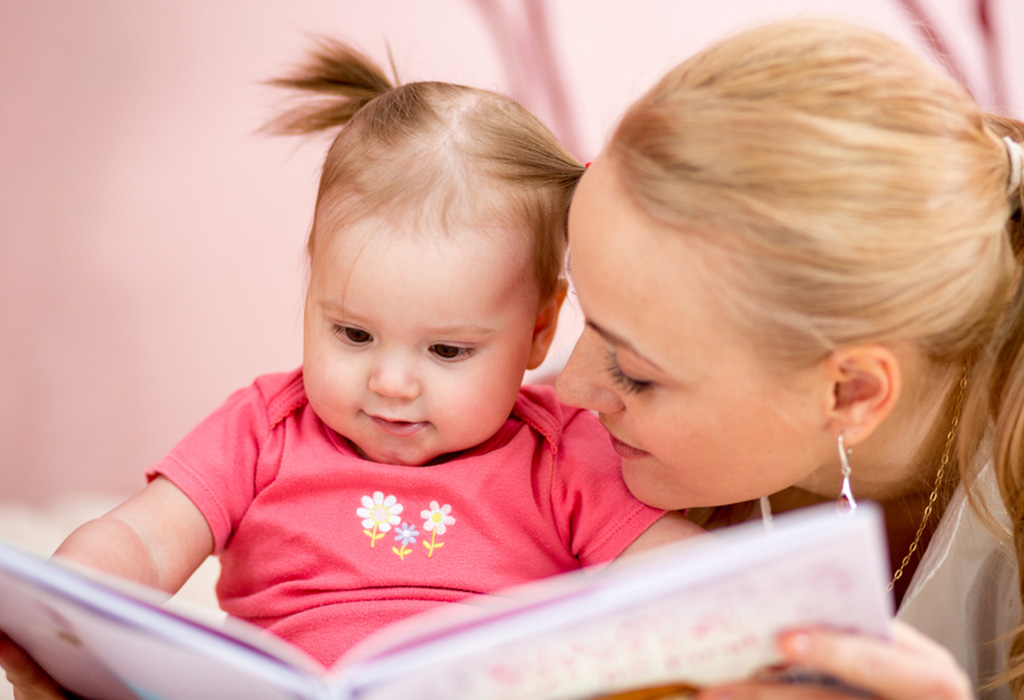
Skill Development: Cognitive
What You Will Require: Well-illustrated picture books
How to Do It:
- Get a broad book with big colourful images and illustrations, and dive right into the story.
- Encourage your little one to touch and feel the book.
- Your baby may have a short attention span and jump to the next page. Even a few seconds of seeing counts and it’s normal.
- Be expressive, use gestures and explain in an entertaining or storytelling-way.
2. Talk to Him
Talking to your babbling baby is one of the best surefire ways to help him learn the nuances of language and master babbling better. Here’s how you can do it.
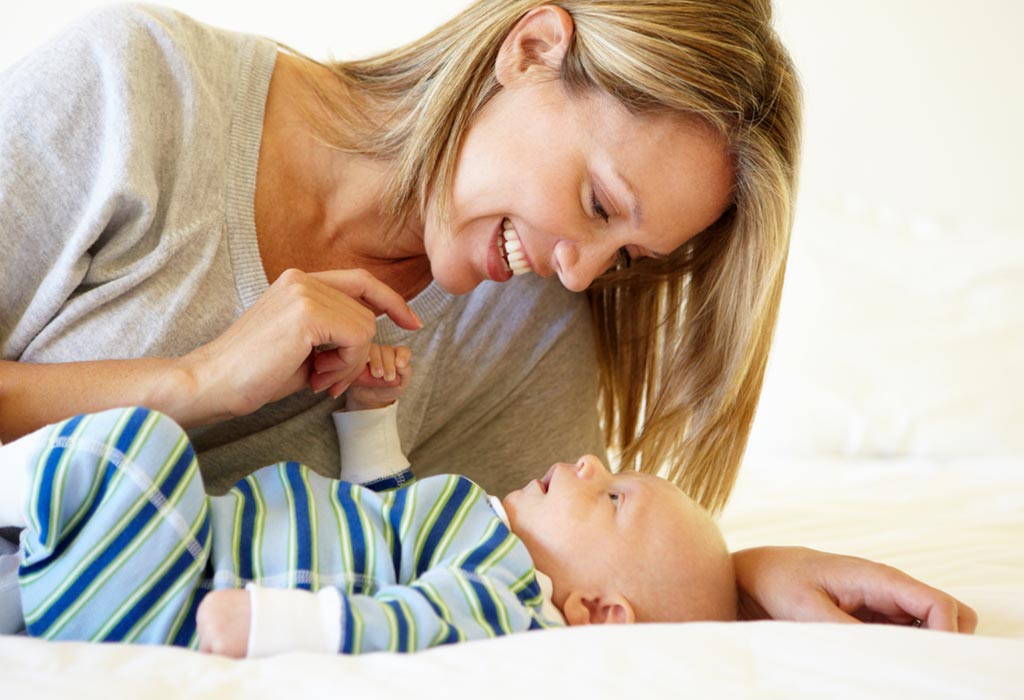
Skill Development: Cognitive And Motor Skill Development
What You Will Require: Some lone time with your little one (a few minutes)
How to Do It:
- Put your four-month-old on tummy time for a few short minutes or seconds every now and then to develop the back and neck muscles. Make sure your short intervals of tummy time add up to roughly an hour a day.
- Speak out names of objects around you and make funny faces to encourage baby babbling or giggling.
- You can try making animal noises, or funny cartoon sounds too.
- Take it up a notch by tickling his feet or tummy.
3. Exploration Time
Letting your four-month-old play with colourful toys on a play mat is a great way to introduce him to the world of textures. The baby will touch all his toys and even be introduced to the cause of his actions. For example, he will know that an object goes far away when he throws it away.
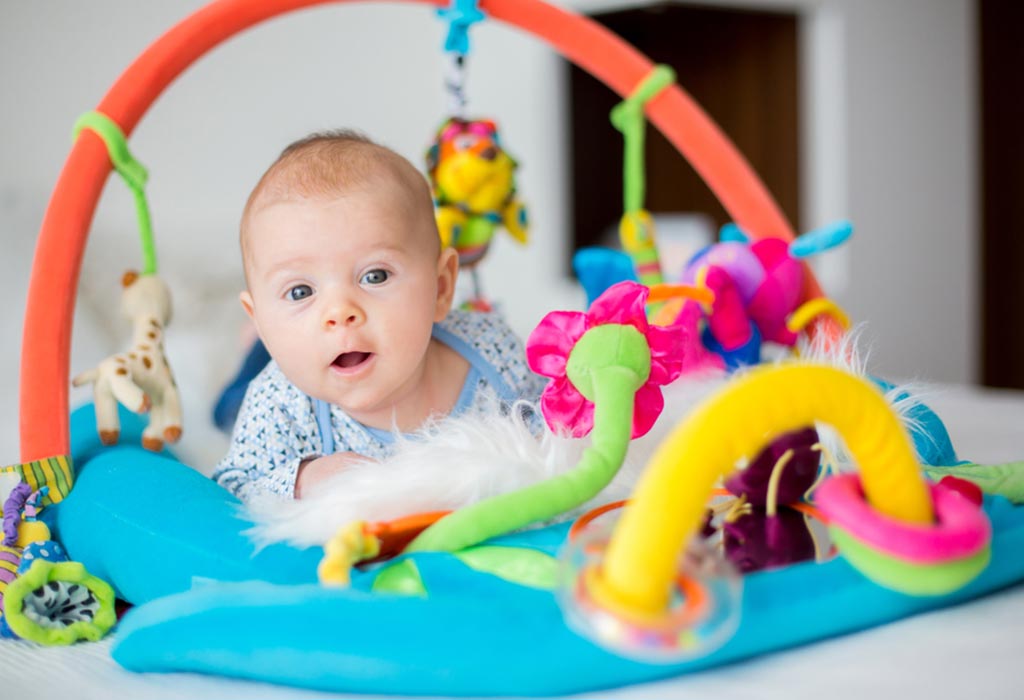
Skill Development: Sensory development and understanding of cause and effect
What You Will Require: A few toys or household objects
How to Do It:
- Get some pillow or cushion covers and mats with textures such as velvet and wool. Let your little one touch and feel the different fabrics.
- Grab a couple of age-appropriate toys which are not choking hazards and let your child fiddle with them.
- Toys such as rattles, bouncy balls and action figures will also help them understand the meaning of cause and effect.
- Exchange toys to and fro and consider buying an activity gym for more fun and exploration.
4. Look at The Mirror
Looking at himself by staring at the mirror has an appealing charm and joy very few can explain.
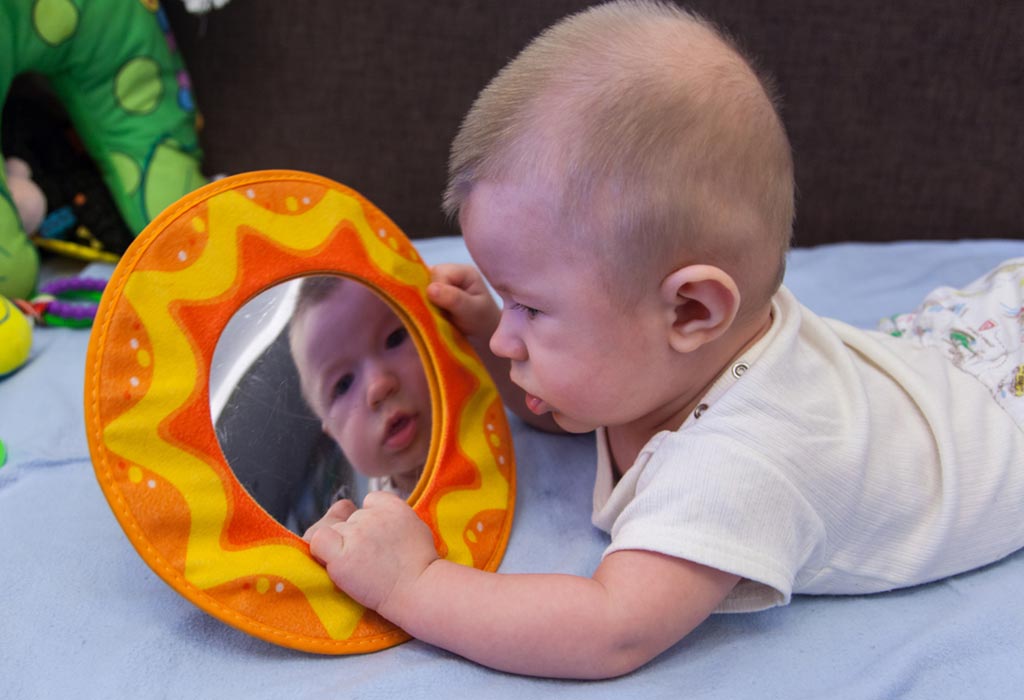
Skill Development: Social and motor skills.
What You Will Require: A mirror at her eye level which is unbreakable.
How to Do It:
- Leave your little one alone with the mirror beside her crib for him to explore.
- Give him time to observe his own facial expressions and gestures.
- Your baby won’t realize that it’s himself staring at the mirror and you can watch as the fun and social development unfolds.
5. Simple Workouts
Maybe it’s finally time for your little one to branch out and try exercising those arms and legs a bit more. If you notice your little one getting energetic, then it’s time to put that energy to good use.

Skill Development: Cognitive and motor skills development.
What You Will Require: Some space and time.
How to Do It:
- Start by lifting your baby up and down. Encourage him to shuffle her arms and feet in the air as you hold him
- Place him gently on the ground and encourage him to practice rolling and
- Set apart different toys on the floor spread out to encourage him to chase them and pivot himself along the way.
6. The Bubble Game
Your little one will have tons of fun playing the bubble game. Here’s how you do it.
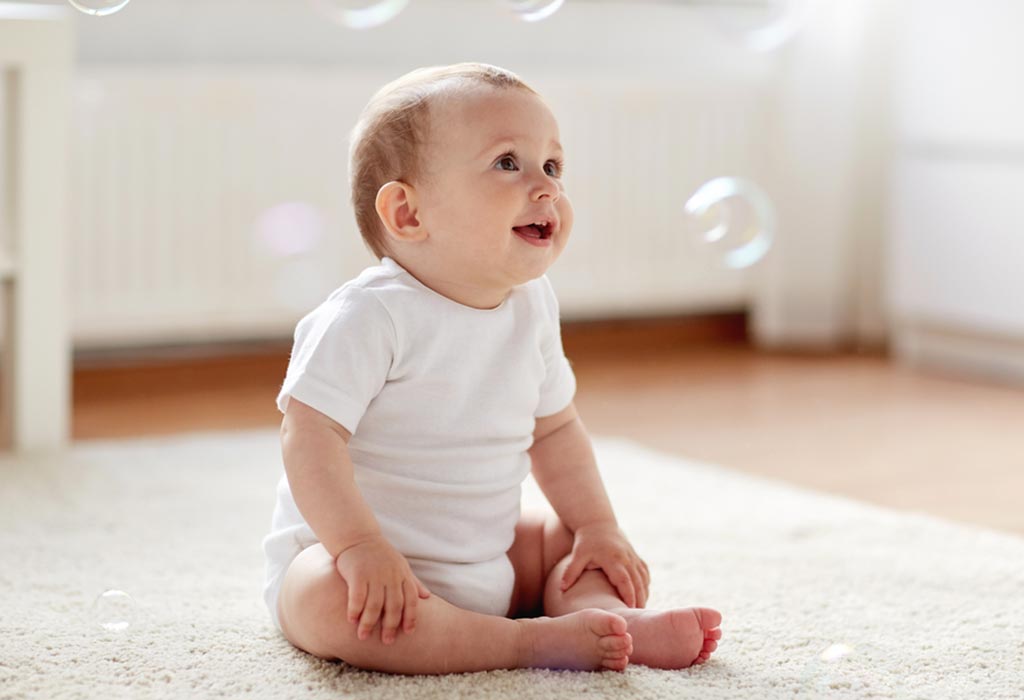
Skill Development: Hand-eye coordination, cognitive development
What You Will Require: A bubble blower and soapy Water
How to Do It:
- Set your young one on a chair and grab a bubble blower.
- Ready the soapy water and dip the blower in it. Blow bubbles in different directions but make sure they don’t touch your baby’s eyes and mouth.
- Your little one will try to catch them and react gleefully when he pops them. Allow him to pop bubbles on his arms, legs and different body parts and make sure you name them out loud to help her identify them and remember.
7. The Rowing Game
Remember the “Row Row Row Your Boat” nursery rhyme? Well, it’s time to put it in action!
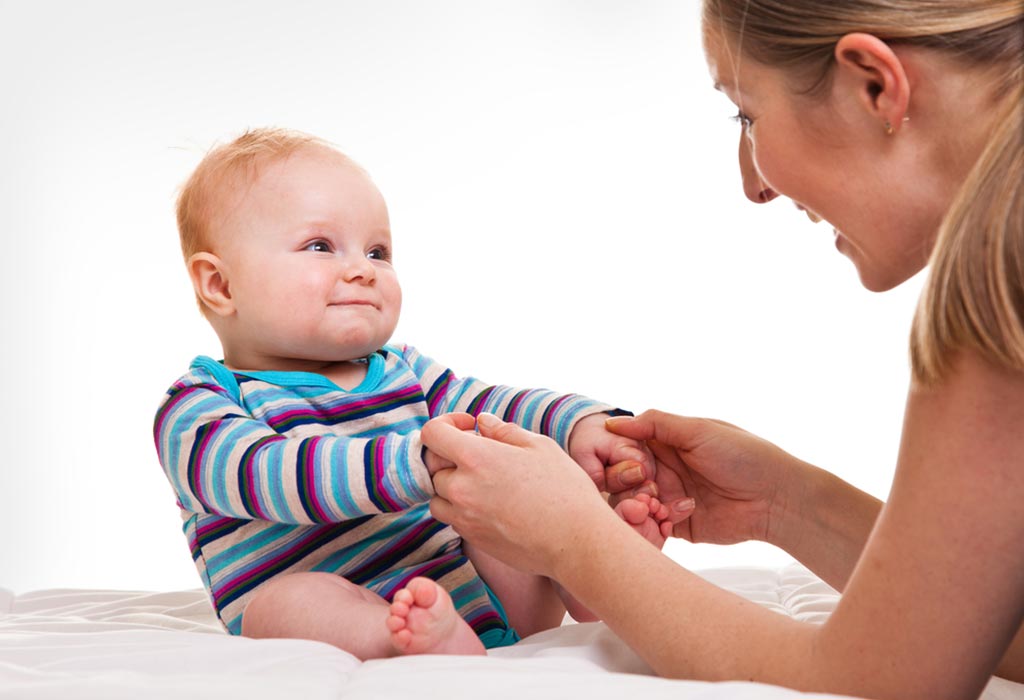
Skill Development: Gross Motor Skills
What You Will Require: Some pillows for cushioning the back and a few minutes to spare
How to Do It:
- Sit your baby comfortably on the bed and place a cushion on their back.
- Hold their hands gently and lean them forward slowly while singing the nursery phrase “Row Row Row Your Boat.”
- Slowly push them back and move in such a way as if you’re teaching them how to row a boat.
- Repeat a few times for a gentle but effective motor skill workout.
8. Sing to Her
You are your baby’s favourite singer, and singing is an awesome way to boost their cognitive and social skills. Children connect with music way better than language. Thus, this activity is sure to hold her attention and inculcate a sense of bonding in your little one.

Skill Development: Cognitive and Social skill development
What You Will Require: A few minutes with your baby
How to Do It:
- Sing your favourite tunes or nursery rhymes to your little one like “Baa Baa Black Sheep Have You Any Wool?”.
- Make sure you add in the words mommy, daddy and the names of other family members in your rhymes in a creative way.
- Use gestures and facial expressions to grab your baby’s attention.
- Repeat the rhymesoften to help your baby grasp new words and remember them better.
9. Roll The Ball
Rolling the ball will show your baby the true meaning of cause and effect. They’ll be gawking at how a simple ball can roll over like that and wonder about it.
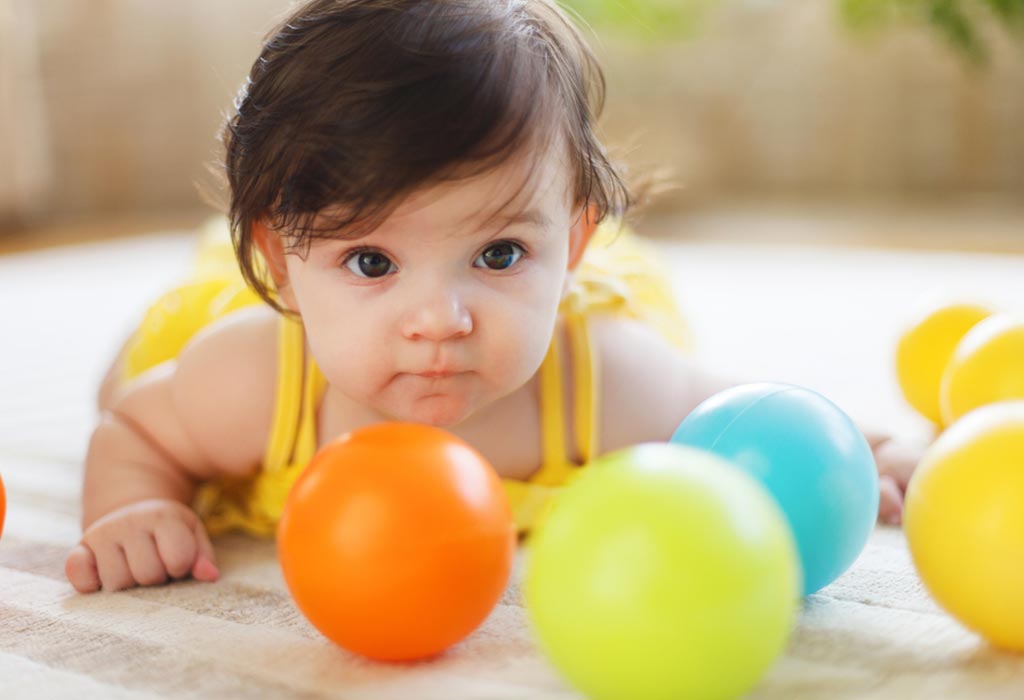
Skill Development: Sensory skills, cause and effect understanding, motor skills.
What You Will Require: Softballs of different colours and textures.
How to Do It:
- Spread out the balls in different directions and allow your little one to chase them.
- Let them lie down on their tummy and play with the balls, experiment with different textures and sizes,and encourage them to push the balls across the floor towards you.
10. Arrange a Play Date
A playdate encourages your little one to interact with other babies and socialise. Making friends will help develop his brain really fast, and he will also have fun playing with more kids.
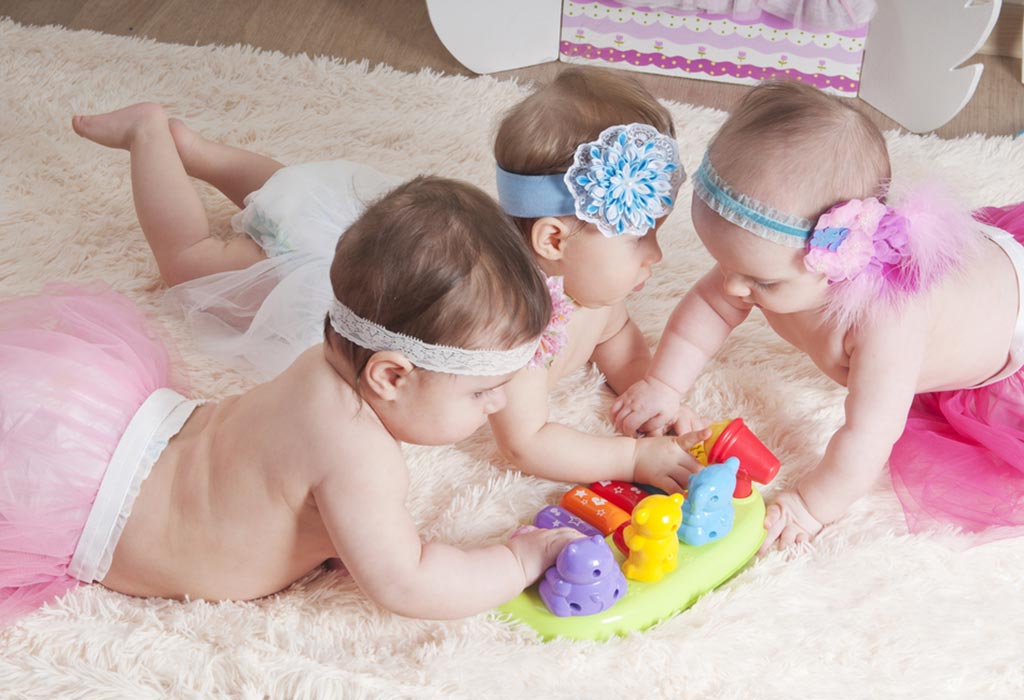
Skill Development: Cognitive and social skill development
What You Will Require: A few friends in your baby’s age group and some free time
How to Do It:
- Invite your friends to your house or the mothersliving in the neighborhood for a playdate. Make sure their babies are in the same age group.
- Place some toys on the floor and allow the babies to play with each other.
- If you feel up to it, you could join in on the fun by playing a little peek-a-boo with them.
11. Exercise his Eyes
As your baby is getting a hand of new things around him, he starts using his sensory organs. This activity is perfect to encourage your baby to use his proprioceptive sense.
Skill Development: Proprioceptive position sense,
What You Will Require: A bottle with some glycerine, water, and glitter in it.
How to Do It:
- Mix equal parts water and glycerine and add the glitter to it.
- Close the bottle cap tight and mix.
- Shake the bottle and keep it in front of him.
- Let the baby watch the glitter settle down.
- Repeat the activity until you have his attention.
If you notice your little one lagging behind or taking some extra time to learn new things, do not fret. Not every baby is the same, and everyone develops at a different pace. Be gentle, be kind and give plenty of time and room for your child’s development. The important thing is to keep exposing your baby to different developmental activities and letting him have fun since that’s what speeds up cognitive, emotional and social growth.









